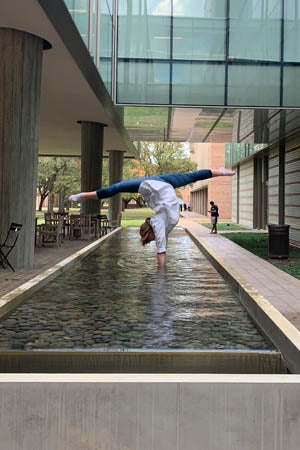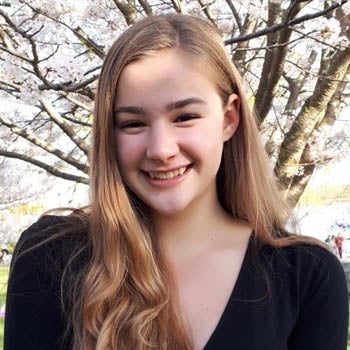Major: Chemistry
Research Advisor: Naomi Halas
Rice Chemistry major Nicola Knowles credits her experiences as a rhythmic gymnast with making her both the person and the chemist that she is today. Rhythmic gymnasts combine skills from dance and gymnastics to create elegant routines that showcase athleticism and grace. Knowles competed on the Canadian national rhythmic gymnastics team for four years, from age 12 to 16. “It was an insane amount of fun. I got to travel around the world for competitions and training camps. I spent a lot of time training in Ukraine,” she said.
Knowles loved that her competitions gave her the opportunity to experience other cultures. “You become a lot more open-minded when you see how people around the world can live so differently and yet still have such similarities,” she explained. To help her continue to learn about people around the world, Knowles hopes to advance the language acquisition she began at her French-speaking high school in Toronto, Canada by double majoring in French.
“I wanted to continue doing gymnastics for the rest of my life,” said Knowles. But near the end of her junior year of high school, she started experiencing hip pain. “I went to see a doctor, and I was told that if I kept training, I wouldn’t be able to walk in a few years.” After leaving the sport that had been her life for years, at first Knowles was not sure what to do next. She decided to explore her interest in science and medicine. “I ended up applying for this summer program at this hospital that had a focused ultrasound lab. I had my first taste of what a grad school experience would be like and I loved it,” she said.

After taking General Chemistry at Rice, Knowles knew she wanted to pursue chemistry research. She said, “It was the first class where I felt like I was really starting to understand the way the world works and why the world works the way it does, and that was the coolest thing ever.”
Now, Knowles explores the applications of plasmonic nanoparticles in Naomi Halas’s lab. “Plasmonic nanoparticles are nanoparticles that, in the presence of light, exhibit a collective oscillation of their conduction electrons. This leads to really interesting effects like heating on the surface of the nanoparticle, really high-energy electrons called hot electrons, and enhanced electric and magnetic fields around the nanoparticle,” Knowles explained.
Previously, Knowles and her graduate student mentor harnessed the light-induced heating of plasmonic nanoparticles to drive a reaction that formed ammonia and hydrogen gas using solar energy. Traditional industrial ammonia production for fertilizer consumes massive amounts of energy in the form of fossil fuels. “We used aluminum nanoparticles coated in magnesium. The magnesium went through cycles between magnesium oxide, plain magnesium, and magnesium nitride and would generate ammonia, and the aluminum underneath would heat up to really high temperatures to power the reaction,” said Knowles.
Next, Knowles is going to employ the enhanced electric and magnetic fields on the surface of plasmonic nanoparticles to detect metabolites present in tiny amounts. “We will use a technique called surface-enhanced Raman spectroscopy. When you combine Raman spectroscopy with the plasmonic nanoparticles, you can see much smaller amounts of materials than you could otherwise,” said Knowles.
When she reflects on her gymnastics experience now, Knowles realizes that it helped her develop the skills she would need in science and in life. “I’d say the number one skill I learned was dealing with failure. I had times when I’d been training for a few months 8 hours a day for one competition and when I got to the competition I’d mess up. And you know, while doing well at competitions made me happy, I didn’t really learn that much. I learned so much from when I failed. It kept me from making the same mistake next time and gave me the strength of character to keep going,” she said.
As scientists, we venture into the unknown to do and learn what has never been done or known before; failure is an inherent part of that. But, as Knowles learned, “If it’s a goal that you’re passionate about, even if you fail along the way, you just keep going, and it’s worth it.”

